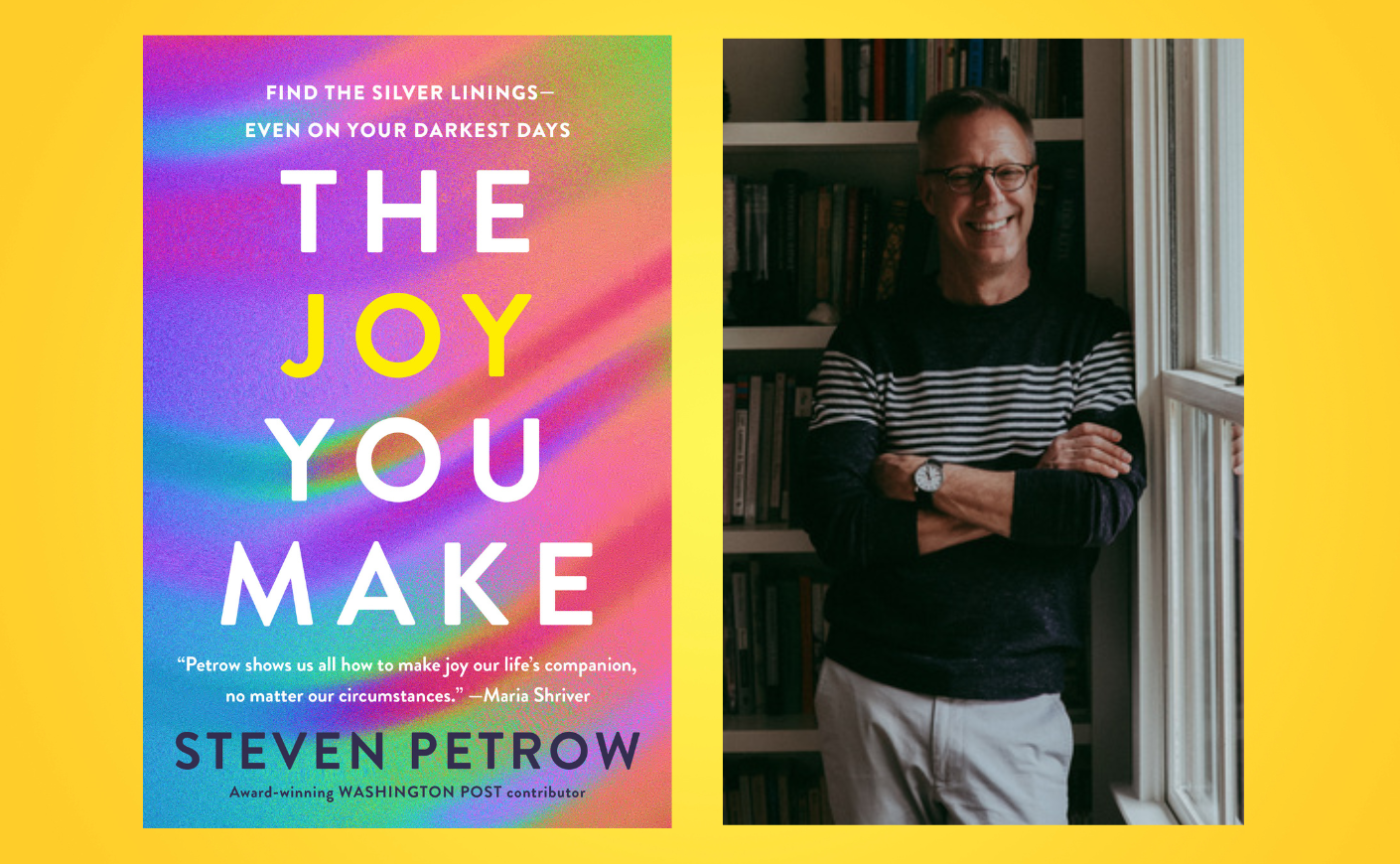When we're going through really challenging times, looking on the bright side can seem easier said than done. Or is it? Steven Petrow is an award-winning columnist for the Washington Post and New York Times who's known for his essays on aging, health, and civility. When he was going through a particularly dark period in his life (more on that below), he had to figure out how to find some light amidst it all. Petrow dug deep into what it truly means to feel joy and turned his search into the new book, The Joy You Make: Find the Silver Linings — Even On Your Darkest Days, out now. Through research, revisiting his own experiences, and conducting interviews with experts, Petrow teaches readers how to find the joy in everything — without veering into fake cheer or toxic positivity.
Petrow's book has earned praise from the likes of Maria Shriver and our very own Katie Couric, so we asked him more about his journey towards cultivating deep gratitude (which he says is different from happiness), who taught him the most during his research, what he hopes we can all learn from his book, and more.
Katie Couric Media: What led you to writing The Joy You Make?
Steven Petrow: 2017 was not a good year for me. My mother died on a snowy January evening, my father on a rainy April morning. In between, my husband moved out of our house, and then before the year ended, my sister, Julie, was diagnosed with stage four ovarian cancer. Even before all that happened, I’ll admit I was a glass-half-empty kind of guy. I often felt as though my life was on autopilot, and I was unhappy for no particular reason. I found myself reading Angela Williams Gorrell’s book, The Gravity of Joy, and felt a sense of connection, particularly when she writes, “Many of us don’t sense joy. We don’t know how to become open to it, how to seek it, or how to share our longing for it. And often, even when it comes, we do not feel free to express it.” YES, I said to myself, starting my own search for joy that turned into this book.
Tell us about one of the most fascinating sources you spoke to or referenced while putting this book together.
I interviewed dozens of really smart people — social scientists, psychologists, ethicists, faith leaders, among others — but it was my sister, Julie, who taught me so much about joy. Despite a terminal diagnosis, Julie lived for close to six years, finding joy in just about every day — her garden, a friend’s key lime pie, beating me in a card game, but especially by deepening her relationships. She knew intuitively how important connection is and how lacking so many of us are in that department. With some brotherly hyperbole, I’d say she’s just as fascinating as the Dalai Lama and Archbishop Desmond Tutu, whose work I relied on and reference.
What's one of the most surprising things you learned while writing?
I’d never really considered that joy is an emotion that’s very distinct from happiness — but it is. One way I’ve come to describe this difference is to think of happiness as a sugary Twinkie, with joy more like a whole wheat muffin. The Twinkie boosts your glucose levels, resulting in a sugar high, and then you crash. The healthier muffin is metabolized more slowly, with no big high or low, leaving you satisfied for a longer time.
I’m not alone in making this distinction. Archbishop Desmond Tutu wrote pointedly in The Book of Joy, “Joy is much bigger than happiness. While happiness often seen as being dependent on external circumstances, joy is not.” I think that last point is crucial; that’s how we can actually make our own joy with what we already have.
If a book club read this for their next meetup, what's a point of discussion that would make for a lively conversation?
I discuss several different ingredients for making joy — including connection and community, helping others, gratitude, kindness, humor, and staying active. Which of these has been most important to you in finding joy? And why?
What do you hope readers take away from your book?
How about hope to start with! But also the idea that joy is not only around us, but within us. It inhabits the present, the past, and even the future as we look toward it. We often don’t recognize joy because it’s not a one-note wonder, which is to say that so many different types of joy exist — serene, ecstatic, sexual, even schadenfreude (the pleasure derived from another person’s misfortune). It also goes by many names, including delight, exuberance, pleasure, peace, contentedness, amusement, wonder, relief, bliss, pride, and gratitude. And it can even be found within grief and sorrow.
Finish this sentence: You'll love this book if you liked...
Katie's memoir. I know that answer takes some hubris, but I appreciated Katie’s book because she was real and unvarnished, sorrowful and joyful, and took us on a helluva good ride. I’ve tried to do the same in The Joy You Make. She was also kind enough to write an endorsement, which I’m honored by, especially these words: “Steven Petrow gives us all a blueprint for ways to not only cultivate, but spread joy … and who couldn’t use more of that in their lives?” Amen.









